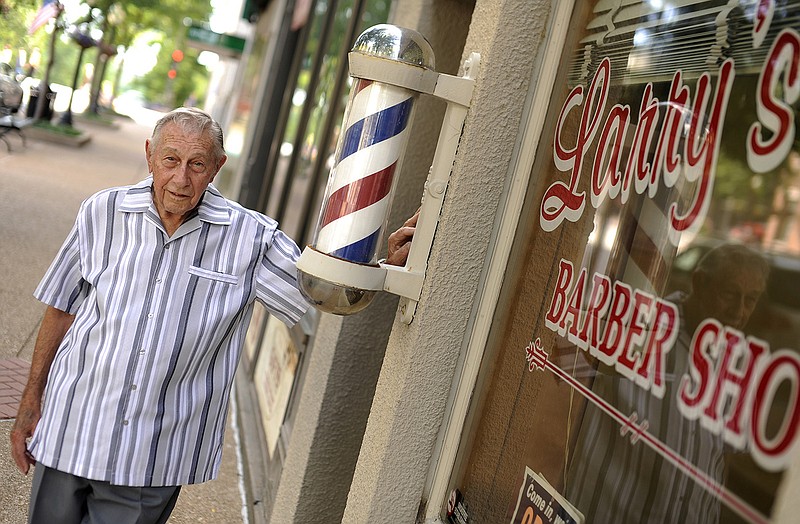An old telephone rings off the hook inside Larry's Barber Shop on Madison Street, causing its 86-year-old owner to leave his leather-bound chair and politely answer. In his 43 years running the business, no one has picked up the landline but him.
A few moments pass, and a smile comes across his face. He's gotten this call before. The woman on the other end is asking if he wants to update his telephone plan, offering to add long distance and even caller ID for next to nothing.
"No, no, no, no, I don't need that," Larry Horstdaniel says on this Thursday morning, speaking into the same tan phone that's been in his store for years. "This is just a plain old barber shop. They come in for haircuts, ya know. We're still old-fashioned."
Not a lot has changed about Horstdaniel's little shop in its 43 years in Jefferson City. The same red and white barber pole spins outside. The same couch sits in the back of the store, imprints left behind from four generations of customers.
Horstdaniel, too, hasn't been quick to change. He still likes to use his hands when he cuts his customers' hair, holding strands between his fingers before clipping with scissors. He acknowledges trimming with an electric razor from time to time, but proudly shares stories of his years in barber school when he wasn't allowed to have one. He was always taught to use his fingers when cutting hair.
"I like using my hands," Horstdaniel says. "I'm very fortunate I don't have arthritis yet."
Originally from Osage County, Horstdaniel moved to the capital when he finished his two year training program at The Motor Barber System in St. Louis. Haircuts cost $1 in Jefferson City, he says, which seemed far preferable to the 75 cent rate in St. Louis. Horstdaniel started at Sanitary Barber Shop on High Street in September of 1954, working alongside three other barbers.
His first day coincided with the Missouri State Penitentiary riots, he remembers. Although the streets were flooded with officers of the law, he says he wasn't too panicked. Compared to the sleepless nights, frequent frostbite and grotesque meals he experienced fighting in the Korean War, a few escaped inmates wasn't all that big of a deal.
He stayed at Sanitary until it went out of business in June of 1971. His co-workers decided to hang up their clippers, but Horstdaniel moved down the street into his own building. He says he saw no reason to retire.
"I only know how to do two things: cut hair and cut grass," he says. "I can't cut grass in the wintertime, so I cut hair."
Still, 60 years later, he doesn't see retirement in his near future. He tentatively tells people he's going to let go of the shop when he turns 90, but his wife of 56 years isn't sure he'll be able to get away from Madison Street. After all, he hasn't taken one vacation day in his 43 years.
Horstdaniel says his favorite part of the job is the conversations. In his time working as a barber, he's heard it all from his customers. Most people use their half-hour haircut as an excuse to gripe with someone, he says, complaining about anything that's been bothering them.
But Horstdaniel acknowledges he's often the one talking, telling stories from his years as a barber. One anecdote he always likes to share is about a man from Australia who found Larry's Barber Shop on the Internet. When the man was in Kansas City on business, he made a point of driving to Jefferson City for a quick haircut.
The story is one of the thousands Horstdaniel estimates he's shared as a barber.
"If I ever have to retire, the one thing I'm gonna miss is the conversations (with) customers," he says.
Today, a little before noon, a man wanders through the front door looking for a trim. It's Grover Beatty, a regular customer and senior vice president of the investment firm Stifel Nicolaus next door. He plops down in a barber chair and patiently waits for Horstdaniel. In his 20 years coming here, he's never had to make an appointment.
The two begin to talk like old friends catching up. Horstdaniel asks him how the stock market is doing, and Beatty responds that it's slow just like every summer. At some point, their conversation turns toward the Thursday Night Live festivities being set up outside of the front window.
Beatty knows they have probably talked about both topics in the past, but he says he doesn't mind. Along with the proximity, the familiarity of the local business keeps Beatty coming back.
"It hasn't changed a bit," he says, inspecting a nearby wall. "I don't think this wall has been painted in the 20 years I've been coming here."
Horstdaniel says he doesn't dream of changing a thing about his store. The way he runs the barber shop has always been good enough for his loyal clientele.
"I've been working on customers for 60 years and I still have them with me," he says. "I must be doing something right."

